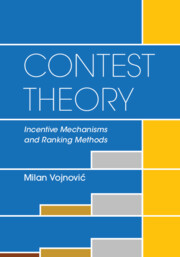Book contents
- Frontmatter
- Contents
- Preface
- 1 Introduction and Preview
- 2 Standard All-Pay Contest
- 3 Rank-Order Allocation of Prizes
- 4 Smooth Allocation of Prizes
- 5 Simultaneous Contests
- 6 Utility Sharing and Welfare
- 7 Sequential Contests
- 8 Tournaments
- 9 Rating Systems
- 10 Ranking Methods
- 11 Appendix
- References
- Index to Notations
- Index
4 - Smooth Allocation of Prizes
Published online by Cambridge University Press: 05 January 2016
- Frontmatter
- Contents
- Preface
- 1 Introduction and Preview
- 2 Standard All-Pay Contest
- 3 Rank-Order Allocation of Prizes
- 4 Smooth Allocation of Prizes
- 5 Simultaneous Contests
- 6 Utility Sharing and Welfare
- 7 Sequential Contests
- 8 Tournaments
- 9 Rating Systems
- 10 Ranking Methods
- 11 Appendix
- References
- Index to Notations
- Index
Summary
In this chapter we consider a class of contests where a prize is allocated to players according to an allocation mechanism that is a smooth function of invested efforts, with one exception: the corner case in which none of the players invest efforts. The smooth allocation mechanism differs from the rank-order allocation of prizes considered in previous two chapters where the allocation is according to a discontinuous function of effort investments. Smooth allocation of prizes may occur not only because of factors such as stochastic production, where individual production outputs depend on the invested efforts, but also because of exogenous random effects, or imperfect discrimination, where the ranking of players is according to some noisy observations of individual production outputs. As a result of such random effects, the probability of winning a prize may well end up being a smooth function of invested efforts. A smooth allocation of prizes may have desirable properties and for this reason may be imposed by the contest design. For example, one of the key features of the smooth allocation of prizes is that the best performing player may not be allocated the prize with some probability, which may intensify the competition and, as a result, elicit larger effort investments. Our overarching goal in this chapter is to characterize strategic behavior in contests under the smooth allocation of prizes and evaluate properties of interest for particular forms of contest success functions with respect to induced efforts and social efficiency. We present a set of axioms and some probabilistic justifications that serve as a motivation for particular forms of smooth prize allocation. This puts in the spotlight a contest success function that admits a general-logit form, which allocates the prize in proportion to increasing functions of individual effort investments. The general-logit function accommodates several interesting and well-studied special cases such as proportional allocation, where the prize is allocated in proportion to individual efforts, or more generally, the ratio form where the prize is allocated in proportion to a power function of the invested effort. At the end of the chapter, we discuss contest success functions of difference form where the contest success function is a function of the difference of individual efforts.
- Type
- Chapter
- Information
- Contest TheoryIncentive Mechanisms and Ranking Methods, pp. 157 - 222Publisher: Cambridge University PressPrint publication year: 2016



